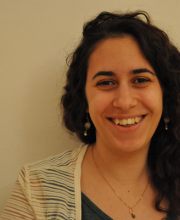Andrew Rippin Best Paper Prize Winner 2023
 The International Qurʾanic Studies Association is delighted to announce that the sixth annual Andrew Rippin Best Paper Prize (open to papers delivered by early career scholars at the 2022 Annual Meeting) has been awarded to Eric Devilliers for his paper: ““Seconding Sinai?: The Re-presentation of Mosaic Theophany in the Qur’an.” The winner of the Andrew Rippin Best Paper Prize receives a cash award. In addition, an expanded and edited version of the winning paper qualifies for publication in the Journal of the International Qur’anic Studies Association.
The International Qurʾanic Studies Association is delighted to announce that the sixth annual Andrew Rippin Best Paper Prize (open to papers delivered by early career scholars at the 2022 Annual Meeting) has been awarded to Eric Devilliers for his paper: ““Seconding Sinai?: The Re-presentation of Mosaic Theophany in the Qur’an.” The winner of the Andrew Rippin Best Paper Prize receives a cash award. In addition, an expanded and edited version of the winning paper qualifies for publication in the Journal of the International Qur’anic Studies Association.
This award is given in honor of Professor Andrew Rippin (1950–2016), a leading scholar of the Qurʾān and inaugural president of the International Qur’anic Studies Association (2014). Prof. Rippin is remembered as “an esteemed colleague, revered mentor, and scholarly inspiration to many members of the IQSA community.” An announcement regarding submissions for the seventh annual Andrew Rippin Best Paper Prize will follow the 2023 IQSA Annual Meeting.
An abstract of the award-winning paper follows:
“Seconding Sinai?: The Re-presentation of Mosaic Theophany in the Qur’an”
Mosaic theophany constituted an axis of exegetical controversy in Late Antiquity. Jews and Christians offered contrasting accounts of what Moses saw at the Burning Bush and at Mount Sinai and therefore assigned different significance to these visual dispensations. In particular, Christian theologians interpreted Mosaic theophanies in a way that emphasized Jesus Christ’s prophetic and ontological superiority. Jesus Christ, they argued, alone truly saw God; Moses did not see God atop Mt. Sinai, and insofar as he saw God, he saw the coming of Christ.
An investigation of how the Qur’an receives the Mosaic theophanic accounts and the logic behind its reformulations remains a scholarly desideratum. This paper, then, outlines how the Qur’an systematically re-presents these two biblical episodes (e.g., in Q 7:142-172, 20:9-36, 27:6-12, and 28:29-35) to respond to Christian and Jewish presentations of theophany and visual dispensation. I argue that, in these passages, the Qur’an takes up Christian exegetical narratives and their paradigm of vision in order to inventively incorporate many late antique traditions into its own prophetology. In these Qur’anic accounts, vision delineates a boundary between God and man. However, prophetic authority is based upon the prophet’s ability to see – either God, or facets of the Unseen. Thus, the Qur’an presents a creative tension: Muhammad’s humanity seems to preclude vision of God; yet, his prophetic superiority seems to affirm a more authentic vision of God than those of other prophets (e.g., Q 53, 81).
 Eric DeVilliers hails from Fredericksburg, Virginia. He is a PhD candidate at the University of Notre Dame, specializing in Qur’anic studies and Islamic theology. His dissertation investigates the roots and significance of the controversy surrounding the vision of God (ru’yat Allah) from Late Antiquity to the early Islamic period. He is currently performing research in Cairo on a Fulbright student research grant that explores the topic of the vision of God in the Kalām tradition.
Eric DeVilliers hails from Fredericksburg, Virginia. He is a PhD candidate at the University of Notre Dame, specializing in Qur’anic studies and Islamic theology. His dissertation investigates the roots and significance of the controversy surrounding the vision of God (ru’yat Allah) from Late Antiquity to the early Islamic period. He is currently performing research in Cairo on a Fulbright student research grant that explores the topic of the vision of God in the Kalām tradition.
Want to try your hand at next year’s Andrew Rippin Best Paper Prize? Submit your proposals for the Call for Papers: IQSA Annual Meeting 2023 to be held in San Antonio, Texas this November!
© International Qur’anic Studies Association, 2023. All rights reserved.

 Adi Shiran is a Ph.D. student at the University of Chicago Divinity School. Shiran earned a B.A. and an M.A. in Arabic language and literature from the Hebrew University of Jerusalem, where she studied in the Mandel Honors Program, and an M.A. from the Freie Universität Berlin. Shiran’s research interests include medieval Islamic, Christian, and Jewish exegesis, Judeo-Arabic literature, and Mu tazilite kalam. In her dissertation, she deals with the notion of the ‘sealing of the hearts’ in tenth-century Qur’an and Bible exegesis. IQSAweb.org 25 Other current research projects include Islamic and Jewish interpretations regarding the physical appearance of the serpent/Satan, and a translation of Saadia Gaon’s Judeo-Arabic discussion on the suffering of animals in his commentary on Genesis. Shiran earned a teaching certificate in Arabic from the Hebrew University of Jerusalem. She taught Qur’anic Arabic at the University of Chicago and taught Classical and Modern Arabic in high schools for several years.
Adi Shiran is a Ph.D. student at the University of Chicago Divinity School. Shiran earned a B.A. and an M.A. in Arabic language and literature from the Hebrew University of Jerusalem, where she studied in the Mandel Honors Program, and an M.A. from the Freie Universität Berlin. Shiran’s research interests include medieval Islamic, Christian, and Jewish exegesis, Judeo-Arabic literature, and Mu tazilite kalam. In her dissertation, she deals with the notion of the ‘sealing of the hearts’ in tenth-century Qur’an and Bible exegesis. IQSAweb.org 25 Other current research projects include Islamic and Jewish interpretations regarding the physical appearance of the serpent/Satan, and a translation of Saadia Gaon’s Judeo-Arabic discussion on the suffering of animals in his commentary on Genesis. Shiran earned a teaching certificate in Arabic from the Hebrew University of Jerusalem. She taught Qur’anic Arabic at the University of Chicago and taught Classical and Modern Arabic in high schools for several years.